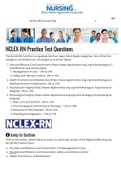Other
NCLEX-RN Practice Test Questions with Rationales.
- Module
- Institution
. You are caring for a client at the end of life. The client tells you that they are grateful for having considered and decided upon some end of life decisions and the appointments of those who they wish to make decisions for them when they are no longer able to do so. During this discussion with...
[Show more]



